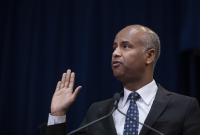Support strong Canadian climate journalism for 2025
The fallout from the labour dispute at British Columbia ports continues to unfold, as the union representing about 7,400 workers abruptly rescinded a strike notice hours after issuing it.
Meanwhile, Prime Minister Justin Trudeau has stepped up action in the federal response to B.C. ports potentially shutting down again in the dispute between the International Longshore and Warehouse Union Canada and the BC Maritime Employers Association, convening an incident response group typically gathered at times of "national crisis" or events with major implications for Canada.
In a statement, the Prime Minister's Office says Trudeau spoke with B.C. Premier David Eby about the labour dispute and agreed on the need to "ensure the stability" of national supply chains.
The ILWU said in a statement late yesterday that it had "removed" the strike notice it issued earlier that same day, but gave no reasons or details behind the decision in what the BCMEA calls "a fluid and unpredictable situation."
Previously, the ILWU issued a 72-hour notice that member workers would relaunch a strike at B.C. ports on Saturday morning, after it rejected a tentative four-year deal on Tuesday that temporarily halted strike action on July 13.
The ILWU initially relaunched its strike on Tuesday immediately after announcing its caucus had rejected the tentative deal reached by negotiators last week, but removed picket lines and returned to work yesterday after the Canadian Industrial Relations Board ruled workers needed to give 72-hour notice for the strike to be legal.
The strike originally started on July 1 and ran for 13 days, shutting down or severely disrupting operations at the more than 30 B.C. port terminals and other sites where ILWU members work — including Vancouver, the country's largest port.
This report by The Canadian Press was first published July 20, 2023.




Comments